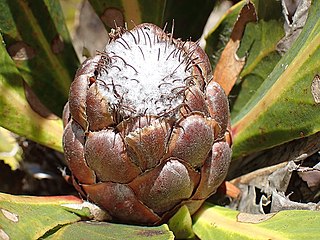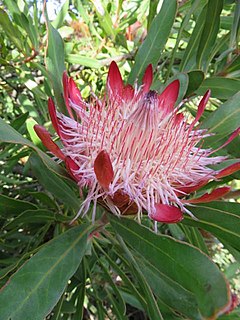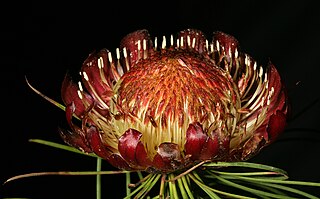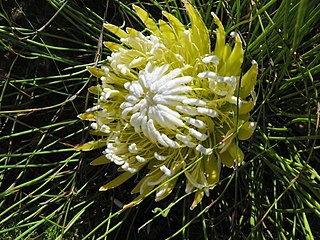
Protea neriifolia, also known as the narrow-leaf sugarbush, oleander-leaved sugarbush, blue sugarbush, or the oleanderleaf protea, is a flowering plant in the genus Protea, which is endemic to South Africa.

Protea acaulos, also known as the common ground sugarbush, is a flowering plant found in the southwestern Cape Region, South Africa. It is also simply known as ground protea; in the Afrikaans language it is known as an aardroos.

Protea pendula, also known as the nodding sugarbush or arid sugarbush, is a flowering plant of the genus Protea, in the family Proteaceae, which is only found growing in the wild in the Cape Region of South Africa. In the Afrikaans language it is known as knikkopsuikerbossie or ondersteboknopprotea.

Protea sulphurea, also known as the sulphur sugarbush, is a flowering plant of the genus Protea in the family Proteaceae, which is only known to grow in the wild in the Western Cape province of South Africa. A vernacular name for the plant in the Afrikaans language is heuningkoeksuikerbos or Skaamblom.

Protea intonsa, also known as the tufted sugarbush, is a flowering plant of the genus Protea within the family Proteaceae, endemic to South Africa, where it is distributed from the eastern Swartberg and Kammanassie Mountains to the Baviaanskloof mountains. In Afrikaans it is known as klossie-suikerbos.

Protea vogtsiae, also known as the Kouga sugarbush, is a small flowering shrub of the genus Protea within the family Proteaceae, which is only found growing in the wild in the southern Cape Region of South Africa.

Protea pudens, also known as the bashful sugarbush, is a low-growing, groundcover-like, flowering shrub in the genus Protea. It is only found growing in the wild in a small area in the Western Cape province of South Africa.

Protea susannae, also known as stink-leaf sugarbush, is a flower-bearing shrub of the genus Protea. The plant is endemic to the southwestern Cape Region of South Africa.

Protea angustata, also known as the Kleinmond sugarbush, is a flowering shrub that belongs to the genus Protea. This plant is endemic to the south-west Cape Region of South Africa.

Protea witzenbergiana, or Swan sugarbush, is a flowering shrub of the genus Protea.

Protea pityphylla, also known as Ceres sugarbush or mountain rose, is a flowering shrub of the genus Protea, in the family Proteaceae. The plant is endemic to the southwestern Cape Region of South Africa.

Protea nana, also known as the mountain rose or mountain-rose sugarbush, is a flowering shrub which belongs within the genus Protea.

Protea lorea, also known as the thong-leaf sugarbush, is a flowering shrub belonging to the genus Protea.

Protea lorifolia, in English called the strap-leaved sugarbush, strap-leaved protea or strap-leaf sugarbush is a flowering shrub which belongs to the genus Protea.

Protea aspera, commonly known as rough leaf sugar bush or aardroos suikerbos, is a flowering shrub that belongs to the well-known Protea genus. The plant is endemic to South Africa and is found at Kleinrivierberg, Bredasdorpberg and Garcia's Pass.

Protea scabra, also known as the sandpaper-leaf sugarbush, is a flowering groundcover that belongs to the genus Protea. The plant is endemic to South Africa and is found from the Hottentots Holland Mountains across the Riviersonderend Mountains, the Kleinrivier Mountains and around the town of Caledon to the Swartberg mountains.

Protea laevis, also known as the smooth-leaf sugarbush, is a flowering shrub that belongs within the genus Protea.
Protea convexa, also known as large-leaf sugarbush, is a rare flowering shrub in the genus Protea of the family Proteaceae, which is endemic to the southwestern Cape Region of South Africa.

Protea punctata, also known as the water sugarbush or water white sugarbush, is a shrub belonging to the genus Protea which is found growing in the wild in South Africa.

Protea humiflora, the patentleaf sugarbush, is a flower-bearing shrub belonging to the Protea genus. The plant is endemic to South Africa and occurs from the Du Toitskloof Mountains to the Langeberg and Waboomsberg. The plant grows to 2 m in diameter and flowers from July to September with its peak in August.



















